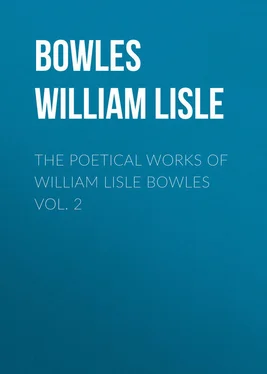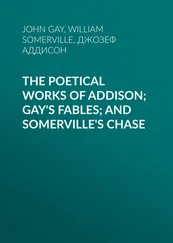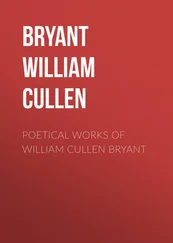William Bowles - The Poetical Works of William Lisle Bowles Vol. 2
Здесь есть возможность читать онлайн «William Bowles - The Poetical Works of William Lisle Bowles Vol. 2» — ознакомительный отрывок электронной книги совершенно бесплатно, а после прочтения отрывка купить полную версию. В некоторых случаях можно слушать аудио, скачать через торрент в формате fb2 и присутствует краткое содержание. ISBN: , Жанр: foreign_antique, foreign_prose, foreign_poetry, на английском языке. Описание произведения, (предисловие) а так же отзывы посетителей доступны на портале библиотеки ЛибКат.
- Название:The Poetical Works of William Lisle Bowles Vol. 2
- Автор:
- Жанр:
- Год:неизвестен
- ISBN:http://www.gutenberg.org/ebooks/32145
- Рейтинг книги:4 / 5. Голосов: 1
-
Избранное:Добавить в избранное
- Отзывы:
-
Ваша оценка:
- 80
- 1
- 2
- 3
- 4
- 5
The Poetical Works of William Lisle Bowles Vol. 2: краткое содержание, описание и аннотация
Предлагаем к чтению аннотацию, описание, краткое содержание или предисловие (зависит от того, что написал сам автор книги «The Poetical Works of William Lisle Bowles Vol. 2»). Если вы не нашли необходимую информацию о книге — напишите в комментариях, мы постараемся отыскать её.
The Poetical Works of William Lisle Bowles Vol. 2 — читать онлайн ознакомительный отрывок
Ниже представлен текст книги, разбитый по страницам. Система сохранения места последней прочитанной страницы, позволяет с удобством читать онлайн бесплатно книгу «The Poetical Works of William Lisle Bowles Vol. 2», без необходимости каждый раз заново искать на чём Вы остановились. Поставьте закладку, и сможете в любой момент перейти на страницу, на которой закончили чтение.
Интервал:
Закладка:
All this told on its poetry; and our wonder, we repeat, is, that it did not tell more. That it did not, was probably owing to the continued prevalence of the power of classical literature. That, increased by the influence of the universities and the great schools, and by the translations made of its masterpieces by Dryden and Pope, contributed to produce and maintain purity of taste, in the midst of general depravation of manners, and to touch many opening minds with the chaste and manly inspiration of a long past age. Hence the poetry of the first half of the eighteenth century, while inferior in force and richness to that of the end of the seventeenth, is superior in good taste, and is much freer from impurities. To this the imitation of French models, too, contributed. Still we see the traces of the period very distinctly marked in its works of art and in its poetry. The paintings of Hogarth, next to the infinite richness of the painter's invention, and the accuracy of his observation and touch, testify to the corruption of these times. They are everlasting libels – as true, however, as they are libellous – on the age of the first two Georges; and we are astonished how such an age produced such a genius, as well as grieved to see how such a genius had no better materials to work on than were furnished by such an age. It is much the same with the novels of Smollett and Fielding, and with parts of the poetry of Churchill, Lloyd, and others. The formal wars of that day, too, were certain to produce formal poetry, and Blenheim was fitly celebrated in Addison's "Campaign." The sceptical philosophy then prevalent was faithfully mirrored in Pope's "Essay on Man," which, exquisite as a work of art, is, in thought, a system of naturalism set to music; and, while its art is the poet's own, its doctrine comes from the "fell genius" of St John (Bolingbroke). Up to Thomson's fine "Ode on the Death of Sir Isaac Newton," and the "Night Thoughts," the great discoveries of astronomy obtained no poetical recognition. Religious poetry, properly speaking, there was none; for the hymns of Watts, although full of piety, can scarcely be called poems; and the most popular poetry of the time was either founded on the Latin, or written in imitation of Pope. Johnson's "London" and "Vanity of Human Wishes" are instances of the former; and of the latter, specimens too numerous to mention abounded.
Thus it continued till about the middle of the century, when there began to appear symptoms of a change. First of all, a "fine fat fellow" from Scotland, who had derived inspiration from the breezes of the Tweed and the Jed, wrote that noble strain, "The Seasons," with its daguerreotypic painting of nature, and its generous, healthy enthusiasm, and the "Castle of Indolence," with its exquisite sketches of character and scenery, and its rich reproduction of an antique style of poetry. Thomson's voice did not, indeed, produce a revolution in taste, but it obtained an audience for a species of writing entirely different from what then prevailed. Young, next, in a bolder spirit, having broken the trammels of Pope, which had confined him, soared up through Night and all its worlds, and brought down genuine inspiration on his adventurous wing. Dr Johnson, although considerably hampered in his verse by undue admiration of the mechanical poets, allowed himself greater liberty in his prose, which glowed with a deep, if somewhat turbid life, and rolled on in a strong and solemn current, which often seemed that of high imagination. Collins, smitten with a true "gadfly," born as one out of due time, and, alas! "blasted with the celestial fire," he brought, anticipated, in part, some of the miraculous effects of more modern poetry. Gray, Mason, and Beattie, three men of unequal name, all wrote in a different style from Addison, Swift, and Pope, and two of them displayed genuine, if not very powerful, genius. Then came Percy, with his "Reliques of Ancient Poetry," which showed what wonders our rude forefathers had wrought by the force of simple nature; and to the same end contributed Ossian's Poems, which, whatever their defects, awakened and startled the literary world, here, in France, and in Germany, by a panoramic view of that "land of mountain and of flood," which was yet to attract so many visitors, and to inspire so many bards. The impulse lent to our prose style by Johnson was followed up by Junius and by Burke, both of whom shot into the discussions of politics and of passing events much of the spirit and the power of poetry. Burke especially, even before the French Revolution effectually roused the world, had given specimens of fervid prose, combining with matter of fact and the most compact wisdom, the graces, the spirit, the imagery, and the language of the highest imagination. Cowper, too, had come, setting religion to rhythm; and, although "veiling all the lightnings of his song in sorrow," yet circulating the power of his genius, even more extensively than the contagion of his grief. Burns, in Scotland, had exhibited his vein of ardent native genius. And lastly, the French Revolution lifted up its volcano voice, and said to the world of literature and song, as well as to the world at large, " Sleep no more ."
From this date the character of poetry was changed, and began to assume that antagonistic attitude to the school of Dryden and Pope which we described in our commencing remarks, and which yet continues. Britain got engaged in a Titanic warfare, an earthshaking contest – a war of opinion, not of treaties – of peoples, not of kings; and instead of "Campaigns," our poets indited Odes to France, to the Departing Year, hymns to "Carnage, God's Daughter," and "Visions of Don Roderick." Our religion became more intense and earnest, and this produced, on the one hand, the fine religious verses of a Montgomery, the poetical prose of a Foster and a Hall, and the rapt effusions of a Coleridge and Wordsworth; and, on the other hand, told even on our scepticism, which became more impassioned too, and wielded against religion a bar of burning iron, like "Queen Mab," instead of a piece of polished wood, like the "Essay on Man." Our morality improved, in outward decorum, at least, and the last remains of the indecency of former times were swept away – to re-appear, indeed, afterwards partially in "Don Juan." Poetry, too, after coquetting for a little, not very gracefully, with Science in Darwin's "Botanic Garden," and "Temple of Nature," aspired to the hand of Philosophy; and the Lake poets and others not merely found a poetic worship in nature, but set to song many of the wondrous speculations of modern psychology. A taste for ancient, simple poetic writers spread widely, and produced Scott's brilliant imitations of ballad poetry, and Wordsworth's early lyrical strains. Popular principles began to prevail, and knowledge to circulate among the lower classes; and they learned not only to read poems with relish, but their "poor dumb mouths" ever and anon were opened to utter a stern and vigorous poetry of their own. Along with these and other beneficial changes, there were, indeed, much extravagance and exaggeration introduced. With the formality and stiffness, much of the point, pith, and correctness of the old school was lost – a good deal of false enthusiasm and pretence, mingled with the real inspiration; jackdaws and mocking-birds, as well as doves and eagles, abounded. But, on the whole, we question if any age of the world has equalled the early part of the nineteenth century, in the quantity, or in the quality, in the power, depth, brilliance, or variety of its poetry.
Читать дальшеИнтервал:
Закладка:
Похожие книги на «The Poetical Works of William Lisle Bowles Vol. 2»
Представляем Вашему вниманию похожие книги на «The Poetical Works of William Lisle Bowles Vol. 2» списком для выбора. Мы отобрали схожую по названию и смыслу литературу в надежде предоставить читателям больше вариантов отыскать новые, интересные, ещё непрочитанные произведения.
Обсуждение, отзывы о книге «The Poetical Works of William Lisle Bowles Vol. 2» и просто собственные мнения читателей. Оставьте ваши комментарии, напишите, что Вы думаете о произведении, его смысле или главных героях. Укажите что конкретно понравилось, а что нет, и почему Вы так считаете.












